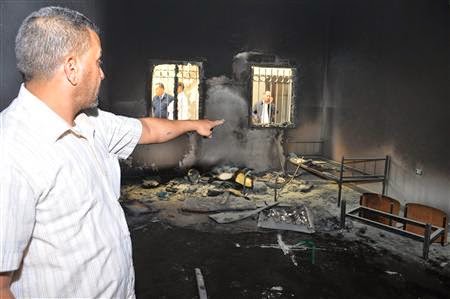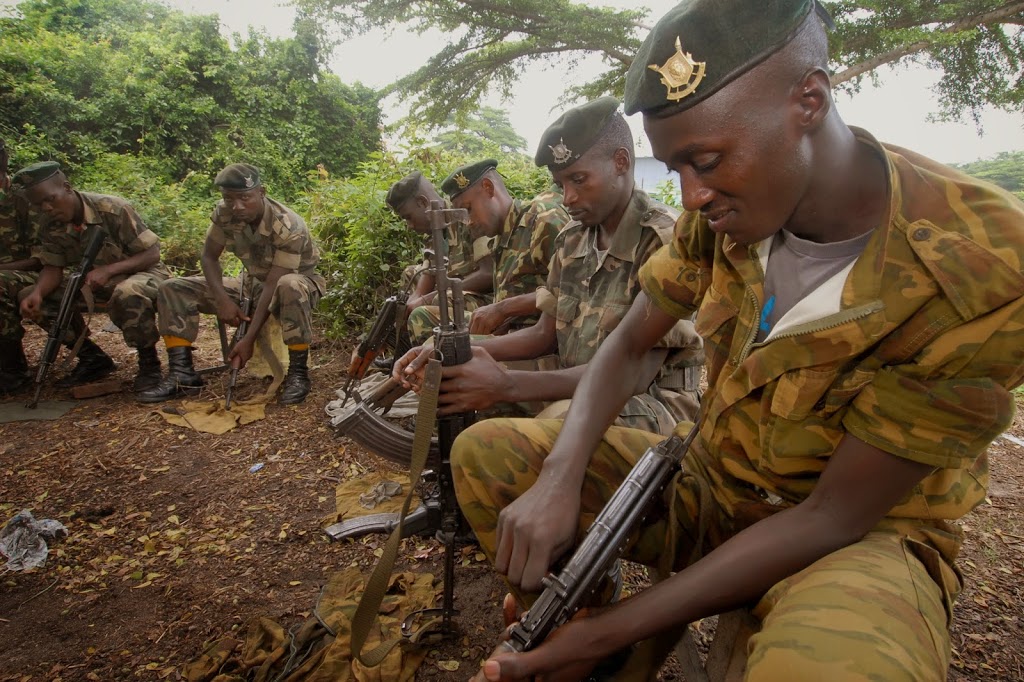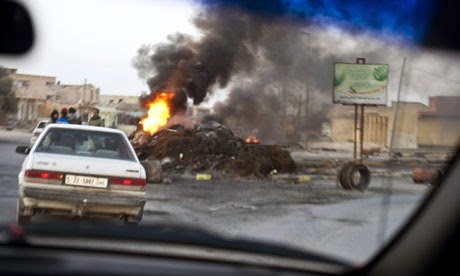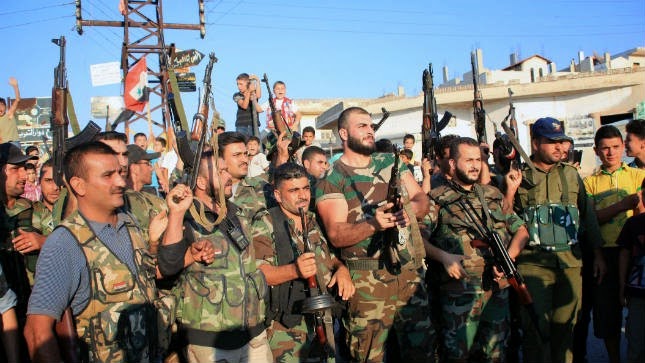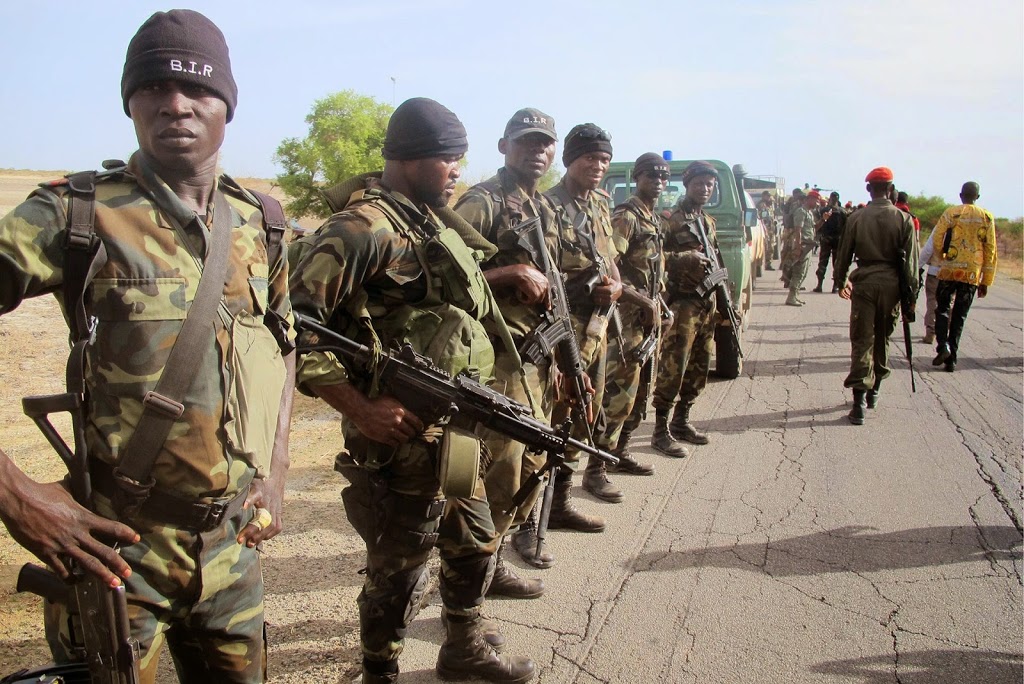The self-proclaimed Islamic State, also known as ISIS, is gaining ground in Libya — taking over the port city of Surt.
Somali, AU troops repel al-Shabaab attack
Somali and African Union troops on Wednesday repelled an attack by al-Shabaab militants against the southern town of Wanla Weyn, police and residents said.
At least three police and two civilians were killed in the attack.
Al-Shabaab said it killed 10 soldiers and police. Officials denied that claim.
Wanla Weyn, which links several key towns in southern and central Somalia, was retaken from al-Shabaab by government and AU troops three years ago.
“[Al-Shabaab] entered the town from different directions, with a large number of fighters armed with guns, rocket-propelled grenades and machine guns, looting civilian shops and business premises,” police representative Abdiwali Farah said.
Al-Shabaab spokesperson Abdiaziz Abu Musca told pro-insurgent radio Andalus the attack had been “tactical”. He did not say whether the insurgents had tried to capture the town.
The fighting in Wanla Weyn comes after the capture of the transit hub Masjid Ali Gadud by Somali and AU troops on Tuesday.
Somalia has battled al-Shabaab for nearly a decade. The group has lost control of practically all major towns, and is increasingly resorting to urban warfare.
Libyan parties committed to safeguarding national unity
Libyan parties expressed on Wednesday their commitment to reject foreign intervention during the two-day UN sponsored dialogue in Algeria ,an Algerian official said.
Abdelkader Messahel, Algerian Delegate Minister for Maghreb and African Affairs who chaired the inter-Libyan meeting, made these remarks at a news conference held upon the wrap-up of the inter-Libyan dialogue round.
“Participants in Algiers dialogue expressed their commitment to the principle of safeguarding national unity of Libya, fighting against terrorism in all its forms, working on forming a national unity government as soon as possible,” Messahel said.
Messahel pointed out that “all this is a strong signal to the international public opinion that Libya needs stability and can solve its problems without foreign interference.”
For his part, the Special Envoy of the United Nations to Libya, Bernardino Leon, hailed the success of Algiers meeting, saying “everyone agreed that the settlement of the Libyan crisis can only be achieved through dialogue, rather than military intervention.”
During the two-day dialogue, 20 political leaders and activists adopted the Declaration of Algiers which reaffirms commitment to respect Libyan political process based on democracy and peaceful changeover of political power.
The participants also expressed their concern over the deteriorating security situation in Libya and the increasing terrorist acts.
Libya Dawn aircraft hit Zintan (with help by Ukrainian technician)?
Zintan was hit three times today by a Libya Dawn jet fighter, according to an LNA Western Region military source. No one was injured in the first two raids, he said, but there had been damage to some buildings. He did not know the extent of the damage in the third raid.
There are reports on social media that a school, a private house and a store were damaged but these have not been confirmed. One report said that the eastern area of Zintan was targeted in one of the raids.
The military source claimed that the jet fighter used in the attacks had flown from Misrata and was one that had been repaired by Ukrainian technicians. These, he alleged, had been brought back to Libya by Abdurrahman Sewehli after his visit to Kiev early last month.
It has been impossible to verify the story about Ukrainian technicians again turning up in Libya, but it is widely believed among both Libya Dawn and LNA supporters.
The attacks are the latest in the tit-for-tat air strikes between Libya Dawn’s and the LNA’s limited and not particularly accurate air forces, and are seen as a reprisal for Monday’s strike on Mitiga airbase.
It was the first LNA attack following the three-day moratorium on air strike against Libya Dawn targets announced last Thursday by the head of the LNA air force, Saqr Adam Geroushi.
The military source told the Libya Herald that there would be a counter attack on Misrata and Mitiga airports “in the coming hours” in revenge for today’s attack on Zintan.
US effort against Isis could expand to include Boko Haram in Nigeria
The war against Islamic State in Iraq and Syria may be expanded to include Boko Haram in Nigeria and militant elements in Libya, secretary of defense Ash Carter said on Wednesday.
Testifying before Senate committee on the topic of whether to authorize military force against jihadis – more than eight months after air strikes and military operations against Isis began – Carter conceded that the authorization’s language would allow “flexibility” to include targets who have affiliated with Isis and threaten the US or its many coalition partners.
“This AUMF [Authorization for Use of Military Force] could apply to operations in and around Libya,” Carter said, “depending on whether or not they met the criteria” of allegiance to and coordinating with Isis to attack the US or one of its partners.
The hearing came as a Iraqi government forces and Shia militias advanced towards the centre of Tikrit in the largest operation against Isis since its lightning it conquered large areas of the country in a lightning offensive last summer. The assault on Tikrit has been backed by Iran, but the US-led coalition has not been invited to participate with air strikes.
Senators on the senate foreign relations committee all expressed their support for the authorization, but the hearing raised many looming questions of US strategy in Iraq and Syria without easy answers for Carter, secretary of state John Kerry, and general Martin Dempsey, the chairman of the joint chiefs of staff.
Kerry tried to downplay the suggestion that an already open-ended conflict could take on yet more dimensions. “As of now in its current state, merely by pledging or flying the flag,” Kerry said, “there’s no decision made or even contemplated that [Boko Haram] would be covered.”
Regarding Iraq, senators voiced fears that neighboring Iran will wield growing influence as it arms and trains Shia militias to fight the Sunni jihadists. Dempsey said that while the US is concerned with many Iranian activities, “their support of the Iraqi forces is a positive thing in military terms” against Isis.
The three witnesses at times sharply rebutted senators’ attempts to stir up anti-Iranian statements, with Kerry defying Rubio’s claim that Iranians do not want US military action in Iraq against Isis.
“The facts completely contradict that,” Kerry said. “They would welcome our bombing.”
“But we are all concerned about what happens after the drums stop beating and Isil is defeated,” Dempsey said, in particular worrying whether Shia militias “when they recapture lost territory, whether they engage in acts of retribution and ethnic cleansing” against Sunnis trying to return home or having survived Isis’s occupation.
‘They’re gonna run Isil out of Tikrit’
The offensive to retake Tikrit “will be a strategic inflection point one way or another in terms of increasing our concerns or decreasing them”, Dempsey said, noting that Iran could either help Iraq economically or destabilize it through many means. He estimated there are about 1,000 tribal Sunni forces, approximately 3,000 Iraqi troops, a “couple hundred” Iraq counter-terrorist personnel, and around 20,000 members of Shia militia trained and armed by Iran.
“They’re gonna run Isil out of Tikrit,” Dempsey said. “The question is what comes after.”
There are also questions about training forces to fight both Isis and Syrian president Bashar al-Assad, including about an “Assad component” of the authorization that might widen it to better defend Syrian rebels.
Carter said that the administration is discussing whether and how how it can offer rebels protection, admitting “we’re not going to be able to recruit men into that force unless we agree to support them on some level.”
“In the meantime we’re attacking Isil where we can,” he said, using another acronym for Islamic State.
The stark questions of recruiting, training and objectives for Syrian rebels has drawn comparisons by Council on Foreign Relations fellow Micah Zenko to the US-orchestrated – and doomed – Bay of Pigs invasion in 1961.
Pressed about the Obama administration’s vague strategy in Syria, Kerry said: “We are committed to other activities that are specifically focused on the Assad regime,” but refused to describe those “activities” outside a classified setting.
Kerry said the training program for Syrian rebels, for which Congress has approved $500m, is “about to be up and running”.
‘Not contemplating years, not even months’ of war
The senators also demanded clearer explanations about the objectives and end scenarios of the conflict, no details of which were forthcoming from the witnesses.
Carter said “I respect the desire to have a sunset clause” – meaning a set of terms that would bring an end to the authorization – but insisted “there is no foreseeing in my judgement how long it will take to defeat Isil”.
“It’s not contemplating years, not even months to my knowledge,” he said.
The limitations on the use of force, Carter and Dempsey said, would be by prioritizing “enabling” partners over direct action. Isis would be defeated “not simply by cutting off its head, it’s actually got to be rejected from within”, Dempsey said.
All three rejected the suggestion of large numbers of American soldiers on the ground, while allowing they wanted special forces to be brought into action if necessary, “perhaps [for] a specific targeted operation against Daesh [Isis] leadership”, as Carter suggested.
“The limiting principle is the way this particular enemy will be defeated, it won’t be defeated by US military power alone,” Dempsey said.
Anti ISIS-forces retake ‘key terrain’ in Syria
Islamic State makes second attempt to destroy Mar Gorgis Church in Mosul, built in the 10th century
Egypt, Algeria, Tunisia, Italy and Russia to meet next week on Libya
Egypt, Algeria and Italy plan to hold a meeting next week in Cairo over the Libya security crisis and the international efforts to combat the terrorism, Egyptian Foreign Ministery spokesperson Badr Abdel Atty told The Cairo Post Tuesday evening.
The meeting was planned by Egyptian Khaled Fawzy and the Algerian Mohamed Buzeit, the intelligence chiefs of both countries.
Algerian Minister for Maghreb and African Affairs Abdelkader Messahel met his Egyptian counterpart Sameh Shoukry Saturday to discuss the crisis, announcing the coming meetings.
“Dealing with the situation in Libya should be through political action and consensus between political parties, in parallel with decisive combat against terrorism,” said Shoukry during the meeting, adding “this requires joint work and concerted efforts from all international community.”
Messahel affirmed there is coordination between both countries that have direct borders with Libya, noting that a meeting for neighboring countries will be held soon.
On Aug. 24, Cairo hosted a conference with Libya’s neighbors (Tunisia, Sudan, Algeria, Chad and Niger) to find a solution for the Libyan security crisis. The outcome of the meeting called for collecting arms and weapons from Libyan militias, reaching a cease-fire agreement between conflicting groups, drafting a new constitution and conducting inclusive dialogue for the recognition of the legitimacy of the new Libyan Parliament.
Although Egypt supports international efforts to reach a political solution for the Libyan crisis and a political agreement between the conflicting parties, it seeks to gain international support for military intervention to battle alleged terrorist groups there.
Following the release of a video showing the execution by beheading of 20 Egyptian Coptic Christians in Libya’s Sirte by a Libyan branch of the Islamic State group in February, Egypt launched six airstrikes on suspected IS bases in Eastern Libya’s Derna and Sirte.
In an interview with France’s Europe 1 radio, President Abdel Fatah al-Sisi called on the United Nations to issue a resolution for an international coalition to intervene in Libya.
Italian Prime Minister Matteo Renzi also called on the United Nations Security Council to send a U.N.-led “mission” to Libya as fast as possible, the Italian News Agency Aki reported in February.
Italy’s envoy to Libya Giuseppe Grimaldi and Italian Ambassador in Cairo Maurizio Massari met Saturday with Egyptian Assistant Foreign Minister for Neighboring Countries’ Affairs Ossama al-Magdoub, discussing the recent developments in Libya and how to deal with them politically, stated the Egyptian State Information Service.
Renzi met Friday with Russian President Vladimir Putin and tackled the Libyan crisis, saying “The role of Russia, for its history and its role in the United Nations Security Council, may be crucial,” AP reported.
Libyan warring parties’ meetings
Since the overthrow of Libyan Leader Muammar Gadhafi in 2011, Libya has experienced ongoing conflict between Islamists from the northern parts of the country and military forces. Due to chaos in the capital Tripoli, the new government and the interim Parliament have made the city of Tobruk their headquarters. Militias and Islamist groups control most of the country outside of Tobruk.
Algeria will host a meeting between the conflicting parts of Libya Wednesday to reach a political settlement. “Algeria has had contacts with all Libyan parties and has received many Libyan players without distinction, except the terrorist groups that are known as such at the United Nations,” Messahel tols channel 3 radio on March 4.
U.N.-backed talks between the Libyan conflicting parties were held in Morocco to reach an agreement Saturday, according to a statement from the Moroccan Ministry of foreign Affairs.
Meanwhile, Tunisian Foreign Minister Habib Essid will visit Algeria Wednesday to discuss the Libya crisis; he previously announced his rejection to any military intervention in Libya, according to a statement from the Tunisian Foreign Ministry Monday.
The 23th round of the Arab Interior Ministers Council meetings kicks off Wednesday in Algeria to discuss the counterterrorism in the region.
African Forces encircle Boko Haram in Nigeria
Military forces from Niger, Nigeria, Chad, and Cameroon have encircled Boko Haram forces and are trying to capture the group’s leader, Abubakar Shekau, alive.
According to Time, residents in Niger and Nigeria say their doors on their homes are shaking from the “booms of fighter-jet missiles and the shutter of artillery fire” as troops draw the noose tighter around Boko Haram fighters.
The attempt to end a six-year expansion of the terror group comes after Boko Haram is thought to “[control] some 20,000 square kilometers in Nigeria’s northeast, forming a rough square bordered by Niger, Chad, and Cameroon.”
Boko Haram fought when convenient and escaped when needed.
And now, with military forces from four African countries encircling the terror group, there is little room to escape.
Through the lenses of these current military efforts, Boko Haram’s March seven-pledge of allegiance to ISIS is seen as a desperate move to encourage other Muslims to join the fight.
BBC News reported that Nigerian Army spokesman Colonel Sami Usman Kukasheka compared Boko Haram leader Shekau to a “drowning man,” adding: “There is no surprise that he is craving support from fellow terrorists across the world.”
Egypt President: We need U.S. support ‘more than ever’ against radical Islam
Egyptian President Abdel Fattah el-Sisi sat down with Fox News’s Bret Baier on Monday and discussed a variety of issues concerning the ongoing conflicts in the Middle East.
The Egyptian leader suggested the creation of an “Arab ready force” to combat the Islamist jihadist groups in the region. Another suggestion of Sisi’s was that Islam itself had to undergo a religious “revolution” against its radical clerics.
Sisi said, through an English translator, that Egypt needs the support of the United States “more than ever” in its fight against Islamic fundamentalism. Furthermore, he hoped to see a “big response from capable countries” in the region, who all too often sit on the sidelines.
Sisi urged the U.S. to reconsider its suspension of arms to his country and said that it sent a “negative indication to the public opinion that the United States is not standing by the Egyptians.”
The Arab force would consist of troops from Saudi Arabia, the UAE, Kuwait, Jordan, and other countries, which would be “capable of defending” their vital national security interests, Sisi explained. However, some Western pundits have warned that empowering an Arab force may not be in the best interests of the United States in the long-run, as the leadership changes in Middle Eastern countries tend to be unpredictable.
The Muslim Brotherhood promotes a dangerous brand of “political Islam,” Sisi said, explaining that the group has turned his people’s “lives into a living hell.”
The Egyptian President’s ascendancy came after his people rose up against the tumultuous reign of Muslim Brotherhood president Mohammed Morsi. Sisi rejected labeling Morsi’s dethroning as a “coup,” explaining that millions of Egyptians flooded the streets demanding he be removed from power.
Separately, U.S. Secretary of State John Kerry is set to meet with the Egyptian President on Thursday, while attending the Egypt Economic Development Conference in Sharm el-Sheikh.
The U.S. State Department said of Secretary Kerry’s upcoming visit with Sisi:
The United States is committed to strengthening its long-term strategic and economic partnership with Egypt. We continue to work with the Egyptian government to help the Egyptian people stabilize and grow the economy, create jobs, educate young people, improve access to health care, and to help realize the aspirations of the Egyptian people for an inclusive, rights- and freedoms-respecting, and peaceful political climate.
- « Previous Page
- 1
- …
- 150
- 151
- 152
- 153
- 154
- …
- 268
- Next Page »
